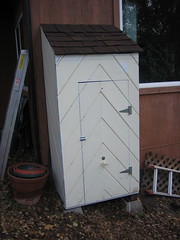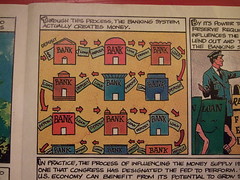Frugal is the New Black
I was disoriented by this new year. Something fundamental had changed, but it wasn't that we were bidding good-bye to an egregious regime and welcoming a nicer one to replace it; the new one would still answer to the same corporate captains of industry. All the dialogue was now about the economy and how to flog the consumer beast into pulling it back on track. But rather than taking a look at what the consumer might need, our leaders just added more debt burden to the corporate cart. And what with the job losses and homelessness, the consumer beast was on its knees showing its ribs. It made me want to call the humane society.
Slowly it came to me. I realized what it was when the number of home baked goods outnumbered the other Christmas doodads that were being given at Catherine's office. Whereas, before, people felt cheap about making gifts at home, now these do-it-yourselfers were cool. They possessed a skill that allowed them to transcend the money economy. Frugal was in. After 25 years I was back in style.
At my book party in November, in the course of telling the story of the long journey of bringing my book to publication, I showed off my homemade cereal box-book mailer that I had designed because bubble wrap is not recyclable and doesn't protect a book nearly as well. As I pointed out the aerodynamic design wedge that would push through a field of packages like a cowcatcher, my audience offered a murmur of appreciation both for the elegance of the design and the eco-frugality of it. I felt I had satisfied an underlying collective desire for a different sensibility. One that did not waste so much. One that evoked our creativity in useful ways apart from buying something.
My book mailer was an origami of reuse and craftsmanship. I noted that my audience was largely an older crowd, raised on thrifty standards of another time. Those who had laughed at my trash inspired ways had been younger, upwardly mobile, gadget intense consumers. Now they stumbled towards frugality. Cooking utensils, shoe repair, car repair. All were enjoying increased business.
In the baroque era of consumerism, houses were made disposable by the end result of the credit boom. These too big plywood palaces with their cathedral ceilings and theatrical lighting were made suddenly obsolete once people could no longer afford to live in them. Who would have thought that something so large and so expensive and so brand new would cease to serve its purpose? Developers started questioning their visions. Maybe we should build smaller they all seemed to realize at once.
Big visions have never been my forte. When the sky is the limit I want to go home to a one-room cabin. To ward off all the bigness I collected books on tiny houses. There is only one book on the subject thus a tiny collection expanded later with a book on houseboats, one on trailers, another on rustic shelters and one on teaching children to build houses. These I would browse periodically before going to bed.
A Journey of Questions
This new year brought another new feeling for me too, of having come to the end of a long string of questions. I'd spent so many years in hot pursuit of answers that I was suddenly at a standstill looking around wondering where I was headed or had I, in fact, arrived?
"You're like a snake that has been digesting a rat," said Catherine. Yes I was enjoying the satisfaction of a meal well digested. I hadn't known it was going to be such a big meal because I had started with the tail so I thought it was just a passing snack.
It began aptly enough at a restaurant. I was blowing out the birthday candle on my desert and afterwards the waiter asked me what I had wished for. "World peace," I said aping a Miss America earnestness. After wishing for world peace every birthday for several years running, I began to wonder what exactly it would take to achieve peace. Was it just that humans would always use violence against its own kind? If it was a question of human psychology then all we would need to do would be to have a giant consciousness raising to change our minds about choosing war as the default problem solver, but most people I knew were not warlike. If war was the default solution, what was the default problem?
I followed Frances Moore Lappé on her search, in "Diet For A Small Planet", to discover if it was possible to feed all the people on the earth. Because if everyone had enough to eat, then shear numbers alone wasn't the problem. Yes, she said, easily. In her second book, "Food First", she concluded that people had forgotten how to feed themselves because of colonialism, which had laid the groundwork for exploitation of peasant farmers, which was followed by a globalized market system that put the price of food out of reach for those not enrolled in a money earning situation.
Thus my first revelation; the growing of food was not intended to feed people at all. It was intended to make money by feeding grain (a low price commodity) to cattle, thus transforming it into a high price product. The same was true of a box of cereal—grain transformed through a bit of processing, but mostly packaging and marketing, into a seriously pricey product. This meant that poverty was systemic, but peasant farmers didn't mobilize to wage war. When the price of the commodity they grew went even lower due to cheaper product being grown elsewhere flooding the market, they just went to the city to find work and live in slums, while moneyed interest bought up their land. I adjusted my menu to eat lower on the food chain.
I was prompted to ask how a supposedly democratic system like capitalism was allowed to starve such a large number of people? And why did the socialist system, a supposedly people prioritized one also fail to feed its people? I was led to E.F. Schumacher's book "Small is Beautiful: Economics As If People Mattered", a Buddhist approach to economics. Large systems would inherently serve only those at the top who were too far away to see or rectify their mistakes and too stubborn in their ideology to admit it. This led me to the concept of appropriate technology and the search for small, adaptable, locally based systems, which led to my own personal pursuit of various homesteading skills.
As I researched appropriate technology, I questioned why we had to flush our waste (food for other life forms) down a toilet with perfectly good drinking water, which led me to read The Humanure Handbook to learn the history of human waste disposal and the benefits of making my own composting toilet system. I also took a workshop on how to create on site wastewater treatment systems. And thus I understood that centralized public utilities had been created for the public good, but at a cost to the ecosystem in water consumed and nutrients removed from the soil.
And while these systems provided convenience to the masses they were also a large source of income for the few. These few who had much to gain from centralized systems, I realized, were empire builders ie: Romans and aqueducts, Victorians and indoor plumbing—Queen Victoria ruling over the British Empire.
The Persian Gulf War prompted me to see that wars must be fought because empires need resources—oil, the quintessential resource of our time. The history of oil was even more illuminating than the history of agriculture, filling in many missing pieces. Oil wealth allowed a few Texans to buy political power on the state level, then on the national level. They taught the Arabs to do the same, established a cartel with them and voila international power. The cartel toppled the other oil rich mega power, the USSR, leaving the world with only one power headed for consumption of the world.
Empires rarely go backwards. There is no "we have enough power now thank-you"; there was only the pursuit of ever more of everything as if human potential could only be reached by consumption of large amounts of resources to display the grandness of our civilization—leave an eighth wonder of the world, some good ruins for future archeologists to marvel at. Such pursuits were financed by loans. Credit is the power tool of empire building. Credit made bankers happy because once a credit based money system had been established the money loaned was usually put back into a bank and could then be loaned out to more borrowers thus creating money out of thin air. This I found illustrated in a comic book you can order for free from the Federal Reserve.
The loans lined the pockets of bankers with interest money. Thus that which created loans was good for business and was to be encouraged. War was very good for business. In World War I, for instance, a single banking family had financed both sides of the conflict. The strategy became a common practice used to escalate war to prolong the flow of war profiteering. After all, if only one side was financed the other would quickly surrender for lack of funds. Thus is made clear the sin of usury.
The Fall
A credit based money system is a pyramid scheme that relies on growth and more resources being extracted to pay back loans. Loans increased the need to compete for resources. Inevitably resources run out.
Empires like Rome, it seemed, must fall. Collapse happens because top-heavy economies run out of resources. Top-heavy societies grow first on a surplus of food—the Mayans and their corn. A surplus of food allows parts of society to do other things besides grow food. Explore the glory of mankind for instance. Empire was an inverted pyramid balanced on the head of a farmer. Modern farming was now run on a single resource—oil.
Oil for tractors, pesticides and fertilizers, followed by transportation of food products. Two paths of my study, food and energy, had merged into a six-lane highway headed for collapse. Thus I had to ask what would it take to learn to be sustainable? Or was sustainable thinking impossible once empire was set into motion? After all to be sustainable ultimately meant not leaving any trace of yourself. Even collapse scholars were obsessed with saving human knowledge.
Humans obsessed with reaching the full potential of their glory, would likely see every step of expansion as progress until it was too late. Once the collapse becomes obvious empire wants to solve the problem with more expansion, better technology, bigger heads on Easter Island. All theoretically possible; it's the transition to the new technology that will do us in. To paraphrase Einstein, we cannot simultaneously grow while at the same time attempt to solve our growth problem. Defaulting on those loan contracts spells collapse for our economic system. We are forced by our own human created paradigm to continue. At least those of us invested in empire building, in big visions.
Small Is The New Big
Some of us have no such contracts. Some of us have been studying the art of becoming small. Some around me (but not me) even want to disappear taking their selves into the void of a Buddhist no self. As I concluded my journey in search of peace I found a comforting precedent explained in Michael Meade's book "The World Behind The World: Living At The End of Time". When the big vision fails, he pointed out, it is the folk tale, the stories of peasants that show the way to survival. These are the human stories of intuition, egalitarianism and collaboration to save the village. Every culture he pointed out has a Noah's ark tale when what's left of the world is put on a boat to avoid a flood that threatens to drown it. Boat? Houseboat? This too I had studied.
When the grand stories of civilization and empire are bankrupt, so to speak, we who are small, debt free and happy with what we have will prevail. My disorientation, following on the contentment of a meal well digested, had righted itself into the realization that my time had come. The understanding that came from this digestion was now fueling a tremendous surge of creativity. I could now prepare in earnest my ark. I had landed a contract to outfit four closets with shelves cut from discarded doors. I would create a new business niche in building from trash. In the face of dire economic news, I had never felt more optimistic.
Also posted at the energy bulletin
Labels: eco-living, economy, housing, sustainability







